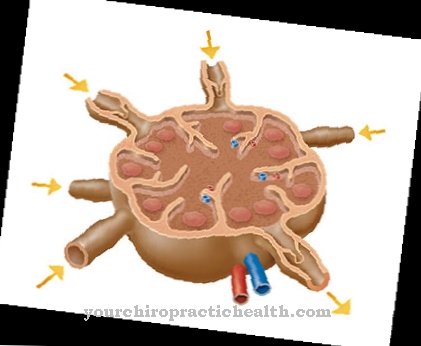Diuretics are active ingredients that significantly increase the flushing out of salts and water by the kidneys from the body (humans and animals). They are therefore used in the therapy of numerous diseases such as high blood pressure, glaucoma and edema.
What are diuretics?

By Diuretics the plasma volume in the blood circulation is reduced and congestion symptoms e.g. if fluid accumulates in the tissue or if the blood volume is too large.
Some diuretics, such as acetazolamide, help urine to become more alkaline, which in the event of overdose or poisoning, promote the elimination of substances such as aspirin.
Diuretics are divided into three main typical groups: Thiazides, Loop diuretics and potassium-sparing diuretics. Each unfolds its effect by acting on a different part of the kidneys and requires different applications and precautionary measures, so it must be precisely tailored to the state of health. The antihypertensive effect of some diuretics should also be seen in this context, regardless of their diuretic effect.
Application, effect & use
Loop diuretics increase the blood flow to the kidneys and therefore wash out up to 20% of the sodium chloride dissolved in the water. Normally about 0.4% sodium is excreted in the urine. Loop diuretics, like furosemide, inhibit the body's ability to absorb sodium, which means that less water is excreted in the urine and remains in the body's cells. They are used to treat ascites and edema caused by heart failure or liver cirrhosis or kidney disease.
Thiazide diuretics also increase the amount of sodium excreted in the urine. The short-term antihypertensive effect is based on the fact that thiazides lower the cell voltage. In the long term, thiazides have a vasodilating effect. Doctors therefore recommend it as the first treatment for high blood pressure as well as heart problems related to high blood pressure. Only when diuretics alone are not enough are drugs such as beta blockers used.
The term potassium-sparing diuretics refers to the reduction in sodium uptake in the tubular epithelial cells, which helps maintain potassium levels. They are often used in combination with thiazides to prevent a potassium deficiency (hypokalaemia).
Other diuretics are carbonic anhydrase inhibitors, which prevent hypocalcemia or hypercalcemia, osmotic diuretics such as glucose, which retain water in the urine (used via infusions, e.g. for kidney failure) and aldosterone antagonists for intravenous use in heart failure or liver cirrhosis.
Herbal, Natural & Pharmaceutical Diuretics
Are in drug processing Diuretics a chemically heterogeneous group of compounds that stimulate or inhibit the production of various naturally occurring hormones in the body to help regulate the production of urine by the kidneys.
Herbal diuretics are sometimes called Aquaretics This includes applications (often teas) made from horsetail, parsley, celery, nettle or black currant. Various recipes and instructions for use can be found in both Hildegard von Bingen medicine and herbal medicine. Traditional combination preparations with diuretic active components also consist of wild garlic, mistletoe and hawthorn.
Homeopathic remedies to promote excretion are Urtica urens, Berberis, Calcium Carbonicum or Digitalis. Coffee, tea and alcohol are also drinks with a diuretic effect, but they are not thought to have any medicinal effects.
In Germany there are currently more than 100 diuretic preparations with different doses, from over-the-counter generics to prescription-only diuretics such as Esidrix, Aquaphor, Hygroton or Dytide H. Diuretics in the form of water tablets are often recommended in diet forums as a tip for losing weight quickly, for which reason However, the complex mode of action is not recommended.
You can find your medication here
➔ Medicines against edema and water retentionRisks & side effects
Diuretics are generally safe, but may cause side effects if used continuously or overdosed. The most common side effect of diuretics is usually increased urination.
Other side effects are a reduction in the amount of blood, disturbances in the electrolyte balance such as a potassium deficiency or excess, hyponatremia (too low sodium level), disturbances in the blood value (overacidification, base content) or an increase in the uric acid content in the blood. This can lead to complications such as dizziness, headaches, increased thirst, muscle cramps, high cholesterol levels, rashes, joint diseases (gout), impotence or menstrual irregularities.
The different modes of action harbor different risks and side effects. Loop diuretics, for example, lead to a significant increase in calcium excretion, which can lead to reduced bone density.




























.jpg)